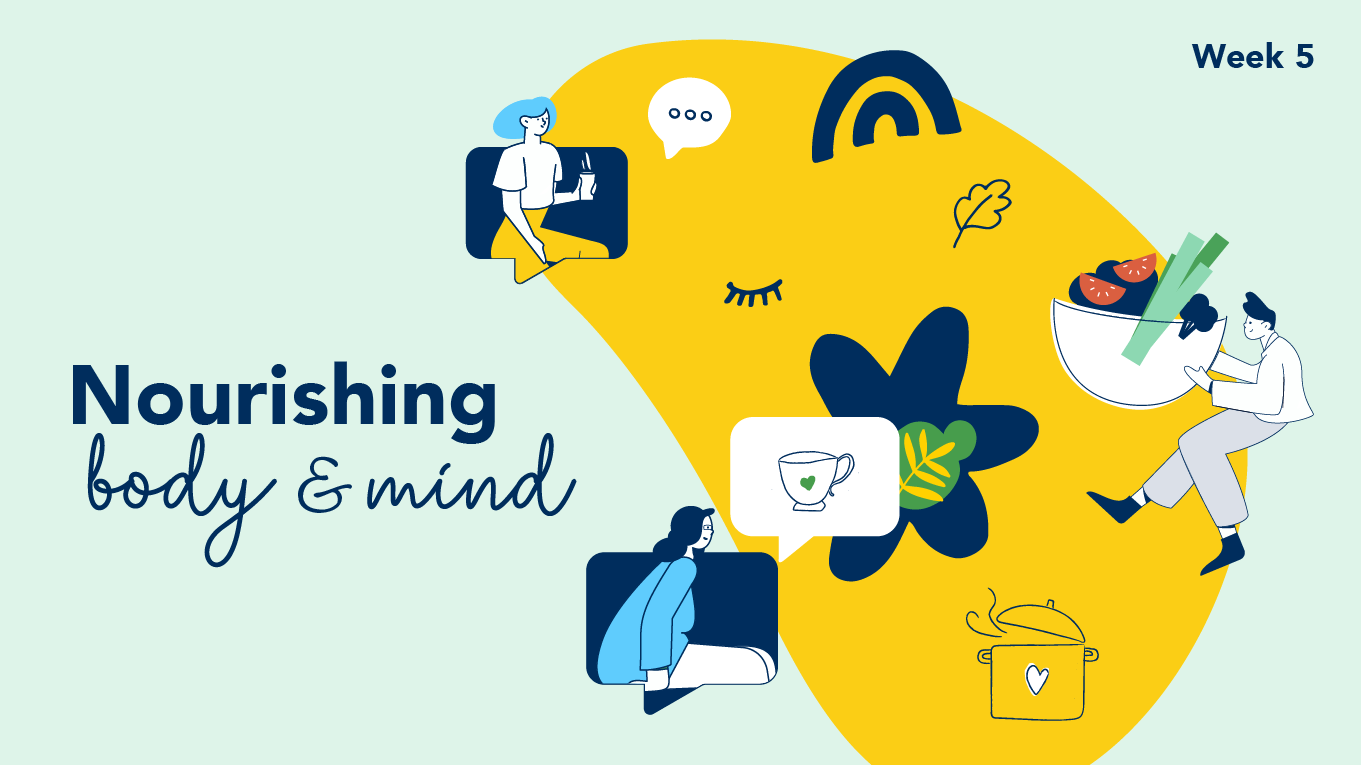
Nourishing Body & Mind–Week 5: Food, Bodies, and Everyone’s Opinions—Practicing Self-Compassion Amid External Pressures and 'Shoulds'
Using Self-Compassion to Overcome Pressure About Eating "The Right Way"
Many of us feel pressured to eat in a specific way to be considered "healthy." We might feel that we have to follow certain diets or avoid certain foods to be healthy or to fit a societal standard of well-being. These beliefs can create stress and even guilt when we stray from these “rules.” Self-compassion offers a more balanced perspective. Instead of beating ourselves up for not following a rigid diet or making the “perfect” food choices, we can learn to approach eating with kindness, flexibility, and understanding.
With self-compassion, we recognize that health is not defined by flawless eating habits, but by how we treat ourselves overall—emotionally, physically, and mentally. It’s okay to enjoy food, to make choices that feel nourishing without striving for perfection. Self-compassion helps us accept that our worth isn’t tied to our food choices, and that we can trust ourselves to make decisions that honor both our bodies and our well-being.
Self-Compassion: A Powerful Antidote to Body Dissatisfaction
Research shows that practicing self-compassion, even briefly, can reduce body shame, lessen the pressure to base our self-worth on physical appearance, and help us appreciate our bodies as they are.
Rather than focusing on external validation or trying to meet unrealistic standards, self-compassion invites us to treat ourselves with kindness and understanding. It allows us to let go of harsh judgments about our bodies and food choices.
Remember: Self-compassion is about treating yourself with kindness, especially when facing pressures or challenges. It encourages you to embrace flexibility and self-trust, recognizing that taking care of your body is not about perfection, but about honoring your needs and well-being.
Practice Self-Compassion
Each week, we encourage you to explore the concepts we've discussed through suggested practices and exercises that you can try at home. These activities are designed to help you deepen your understanding and connect the ideas to your own experiences. Approach this ‘homework’ with curiosity—there’s no need to worry about getting it ‘perfect.’
Home Practice this week:
1. Gratitude Practice
On one hand, list 5 little things you’re grateful for — the small, everyday moments that bring a bit of ease or joy.
On the other hand, list 5 big things you’re grateful for — the foundational parts of your life that give it meaning, support, or direction.
Take a deep breath. Read your lists slowly. Let the feeling of appreciation settle in.
2. Self-Compassion Break
This week, when you find yourself feeling overwhelmed, frustrated, or stuck, pause and gently ask:
“What do I need right now?”
Take a self-compassion break.
1) Notice how you feel right now
2) Acknowledge common humanity
3) Offer yourself some kindness
Even a few minutes of kindness toward yourself — a deep breath, a short walk, a hand on your heart — can make a difference.
Be as kind to yourself as you would be to a good friend. You deserve that care too.
3. Guided Meditation: Compassionate Body Scan
This article meets Iris standards for medical accuracy. It has been fact-checked by the Iris Clinical Editorial Board, our team of oncology experts who ensure that the content is evidence based and up to date. The Iris Clinical Editorial Board includes board-certified oncologists and pharmacists, psychologists, advanced practice providers, licensed clinical social workers, oncology-certified nurses, and dietitians.
Copyright © 2025 OncoHealth. All rights reserved. All materials on these pages are the property of OncoHealth. The information and other content on this website are for information purposes only. If you have any questions about your diagnosis or treatment, please seek the advice of your physician or other qualified health care provider(s).
